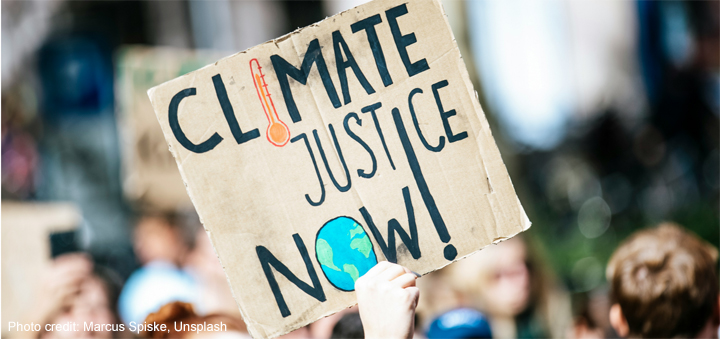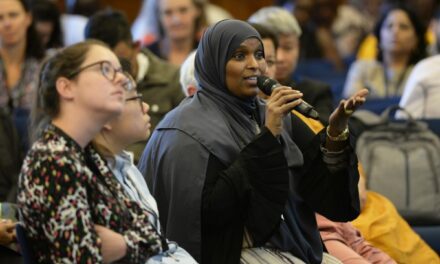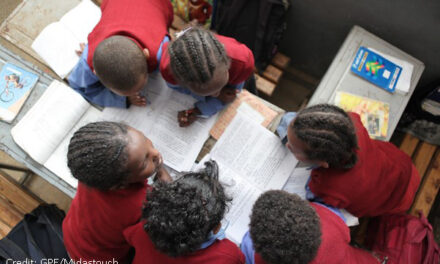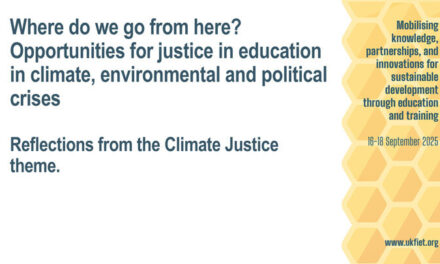This blog was written by Camilla Hadi Chaudhary and Nidhi Singal, Faculty of Education, University of Cambridge. It was first published on the World Bank Inclusive Education Initiative Blog site on 21 October 2024.
Climate vulnerability creates varied experiences especially across marginalised groups. Women living in poverty and refugees, for example, face greater vulnerabilities due to climate crises. Another such group is persons with disabilities. While heterogenous disabilities create varied experiences, having a disability profoundly increases climate vulnerability: ‘the global mortality rate of people with disabilities in natural disasters is up to four times higher than people without disabilities’. This blog discusses the findings of a review of literature published between 2012 to 2024 that examines the intersection of climate concerns, disabilities and education. Key themes emerge from this review: climate change impact on persons with disabilities, the need to include persons with disabilities in discourses that address their concerns, and teaching about climate change. We look at the geographical and disciplinary distribution of these studies and conclude with identified gaps and recommendations.
Climate change impact on persons with disabilities
Disabilities exacerbate climate change effects: ‘Persons with disabilities face unique challenges during every stage of emergency and disaster management due to inaccessible warnings, evacuation, response … and long-term recovery efforts’.
Social and economic stigmatisation ‘by employers as well as educators’ overlap with ‘environmental factors (i.e. limited support from government agencies and disability organisations)’ making stigma a potentially existential threat: e.g. in landslide prone regions of Uganda, persons with disabilities are pushed to village outskirts facing greater precarity to landslides. Heatwaves increase mortality amongst persons and students with disabilities who also face greater susceptibility to water borne diseases during floods. One study highlighted an increased prevalence of acquired disabilities such as asthma and diabetes caused by climate-induced sedentary lifestyles in the United States. Another highlighted challenges faced in accessing tertiary education by deaf farmers in Zimbabwe that limit their capabilities to incorporate climate resilient farming practices. A third highlighted lack of access and ‘teachers qualified in inclusive practices’ creating multi-tiered educational disadvantages in rural Bangladesh.
Including persons with disabilities in climate discourses
Studies advocating broad whole-sector policy reform recommended ‘developing mitigation policies that enable persons with disabilities to contribute to, and benefit from, efforts to decarbonize societies’. Equitable climate action to be ‘designed from the ground up by those who live, embody, and resist these injustices every day’ was foregrounded e.g. one study from Bangladesh advocated for an ‘ equity-focused database and information system’ enabling educators to assess policy and reform impact.
Another highlighted ‘the important role [of caregivers] in contributing to strategies for reducing climate-related health risks.’ Similarly, a Finnish study foregrounded ‘enabling legal and political structures for inclusion’ including institutional capacity in government. A policy-based article advocated using ‘testimonials of climate harm’ to inform inclusive policymaking while one from disability studies called to ‘recognise impairment as an ordinary – not ‘specialist’ or exceptional – dimension of human experience’.
Curricular and pedagogical reform
Education and disabilities literature highlighted curricular and pedagogical reform such as teaching about climate change in accessible ways and integrating climate learning across disciplines, that would embed disability inclusive practices in climate education. One paper advocated transdisciplinary approaches for reconnecting, restructuring, and rethinking: to ‘investigate how disabled populations … can progress in reconnecting with nature’, to restructuring institutions ‘when these have been historically based on inequalities.’ Finally, ‘a radical change of academic institutions towards inclusivity could be the pre-condition for …knowledge co-production’, i.e. a rethinking of what knowledge counts in this space. However, articles with this focus remained few.
Type and location of evidence being drawn on
The literature was dominated by opinion pieces but divided across research methods as reflected in Table 1.
Table 1: Distribution pf research methods across the papers
|
Opinion pieces |
11 |
|
Scoping reviews |
9 |
|
Document and policy analysis |
9 |
|
Evaluations of interventions or trials |
9 |
|
Quantitative survey data |
9 |
|
Participant Interviews |
8 |
|
Observations |
3 |
|
Focus groups |
1 |
|
Key informant interviews |
1 |
|
Qualitative survey |
1 |
Of 63 sources reviewed, the United States dominated single country-based literature (10), followed by Bangladesh (4). Table 2 reflects the geographical distribution of the studies.
Table 2: Geographical distribution of the studies
|
Global focus |
18 |
|
Multi-country (but not global) |
7 |
|
North America |
11 |
|
Europe |
6 |
|
Central and South Asia |
9 |
|
East Asia |
5 |
|
Central and North Africa |
4 |
|
Pacific and Caribbean Island regions |
2 |
Disciplinary dominance and foci
The majority (22) of the articles were from medical and health disciplines, focusing on particular impairments to highlight ‘gaps in the understanding of sustainability and climate science issues’, and advocating reforms in policy, curricula and teacher training. Sixteen studies under the umbrella of social sciences, disability studies and inclusive education foregrounded the impact of climate disasters on Disability Adjusted Life Years (DALYs), such as for example, flood victims with disabilities in Indonesia with limited recourse to protecting themselves. These articles highlighted that policy reforms lack ‘recognition that people with disabilities face unique problems’ in the context of climate change, and intersecting variables such as gender, income inequality further marginalise persons with disabilities ‘due to lack of access to routine medical care, rehabilitative services, or assistive devices’.
Identifying the gaps and imagining inclusive climate education
The findings indicate a dearth of intersectional scholarship on climate and disability in and related to educational discourses. No literature discussed the impact of climate changes on the learning outcomes of students with disabilities. There was a tendency to homogenise lived experiences of persons with different disabilities, with a clear lack of their voices in generating evidence and setting the agenda.
We view the current moment as an opportunity to get the basics right, enabling equitable inclusion within climate discourses. We advocate building on a critical disability framework that foregrounds addressing intersecting inequalities in a cohesive approach. We further advocate for educational reform including curricula for climate education, to re-imagine an overarching inclusive climate education in which the rights and concerns of persons with disabilities are strongly positioned in mainstream debates.




